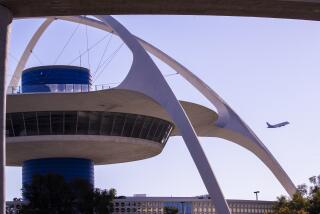Delta Faces $70,000 Fine Over ‘Unairworthy’ Jet
- Share via
The Federal Aviation Administration has proposed to fine Delta Air Lines $70,000 for operating an “unairworthy” airliner with a rudder problem on a flight from Fresno to Los Angeles about six months ago.
“Basically, what they did was fly the airplane--a Boeing 727--with one of its two rudder systems inoperative,” said Fred Farrar, FAA spokesman in Washington.
The plane took off from Fresno on June 17 with a Reno-bound flight plan and landed safely in Los Angeles without incident. But, Farrar said, the pilot failed to notify officials that Delta Flight 1575 had altered its plan and was heading instead for Los Angeles--leaving FAA officials guessing.
“We were looking at it as a possible hijack,” Farrar said.
After investigating the circumstances, the FAA said it notified Atlanta-based Delta of the proposed fine last month.
The agency also said it wants to revoke the operating certificates of the pilot who flew the plane and the dispatcher who permitted the flight to continue. The names of those involved were not disclosed.
Delta declined to elaborate on the FAA’s action.
“It’s premature to say anything at this time since we are in discussions with the FAA,” spokeswoman Jackie Pate said Friday. “It is a proposed penalty. It could change as it is reviewed.”
An FAA spokesman said the agency did not know how many passengers were on Flight 1575 on the day of the incident. According to Farrar, even if the plane were flying without passengers, the procedures followed by the flight crew would have violated FAA regulations governing the safe operation of the airliner.
He explained that the 727’s rudder is in two sections--top and bottom--operated by separate hydraulic systems that provide backup if one section fails in flight. Taking off in the plane with one rudder inoperative could be hazardous, Farrar said, “because in a heavy crosswind it would be hard to control the airplane.
“Secondly, if you had an engine failure on takeoff, you’d need all the rudder you could get to control the asymmetrical thrust of one engine working and one not working.
“It could have been different. If an engine had failed on takeoff, it might not have ended so routinely,” he said.
According to the FAA, the pilot discovered the plane’s mechanical trouble during taxiing just before takeoff and spent 20 to 30 minutes in an unsuccessful effort to correct the problem. The crew apparently was in contact with Delta’s repair and dispatch facility in Atlanta.
“The captain and the dispatcher then devised a course of action to take off the aircraft from Fresno with a flight plan . . . with no intent to fly to Reno but instead on takeoff to immediately divert to Los Angeles because of the mechanical discrepancy,” the FAA said.
Farrar noted that Delta has repair facilities in Los Angeles but not in Reno. He speculated that the apparent motive for changing the plane’s destination without notice was to fly the airliner to Los Angeles, where it could be repaired.
If Delta can demonstrate that there were mitigating circumstances, the FAA could reduce its proposed penalty, but, Farrar added, “we don’t have to.” He said that if the airline refuses to accept the proposed penalty it can appeal the fine to the National Transportation Safety Board.
More to Read
Inside the business of entertainment
The Wide Shot brings you news, analysis and insights on everything from streaming wars to production — and what it all means for the future.
You may occasionally receive promotional content from the Los Angeles Times.










